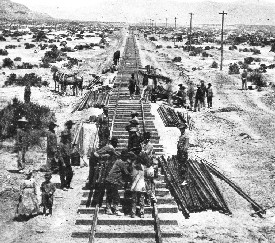Drill, Ye Tarriers, Drill
Thomas F. Casey, 1888 |

 |
What story is this song telling? What is the underlying message? What very real labor conditions is this song about? Accidents, low wages, unfair labor practices. |
 |
Where is exaggeration used in this song? Would you call this song a protest song? Why or why not? Who do you think was the audience for this song? |
 |
Compare this song to "John Henry." How is it the same? How is it different? |
 |
This song uses humor to deliver its message. What other techniques might it have used to deliver the message? Why might workers create a humorous song rather than a sentimental ballad or a protest march? |
|

"Drill, Ye Tarriers, Drill" performed by Cisco Houston on Classic Railroad Songs from Smithsonian Folkways, Smithsonian Folkways, © 2006. Available on iTunes, Spotify, and YouTube.
Gilbert Vandine “Cisco” Houston (1918–61) was distinguished by his voice, a smooth baritone sometimes considered too polished for folk music. His voice was criticized as being too good, too professional, and lacking in authenticity.
His repertoire included folk songs and traditional songs from different arenas of American life—cowboy songs, union songs, railroad songs, murder ballads, and more. He is also known for his renditions of Woody Guthrie originals. |

View the lyrics and music for "Drill, ye Tarriers, Drill"
View the published score.
|
|

 |
| Irish Workers building the Central Pacific Railroad. |
Labor issues were often addressed in nineteenth-century songs. At times they took the form of an individual caught in a tragic situation (fired by a cruel boss, for example) in the typical sentimental tone of the era. Other times, however, such situations acquired vivid comic dimensions. The hero in this song experiences the dangers of the job when a blast blows him sky high, and then finds his pay docked for the time he was away from the drill!
Tarriers used the steam drills that the legendary hammer-man John Henry battled to drill holes to place dynamite charges. The term "tarrier" has a double meaning: one who tarries or delays; and an auger or instrument for boring holes. The song was written in 1888 in the fashion of an Irish folk tune by a New York entertainer who had worked as a tarrier. It became so popular that it quickly passed into oral tradition. |

Compare this song to other railroad work songs:
"John Henry"
"Casey Jones"
"I've Been Working on the Railroad"
|
 Rewrite "Drill, Ye Tarriers" in a different style: as a sentimental ballad like "Break the News to Mother," a rallying song like "John Brown's Body," or as a Tin Pan Alley show tune like "The Bowery." Rewrite "Drill, Ye Tarriers" in a different style: as a sentimental ballad like "Break the News to Mother," a rallying song like "John Brown's Body," or as a Tin Pan Alley show tune like "The Bowery."
|

tarrier: Those who operated the steel drills used to bore holes to place dynamite charges.
dock: To penalize a worker by cutting their pay.
tay: Tea. |
|
